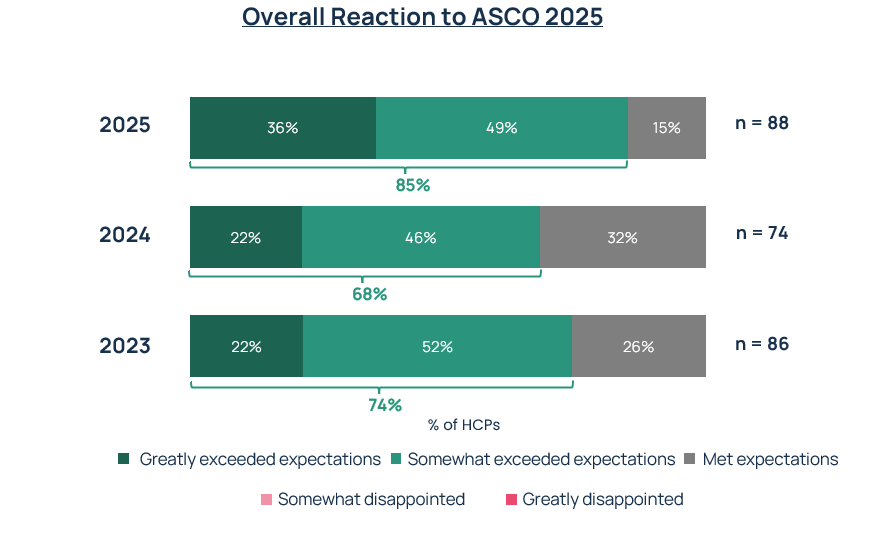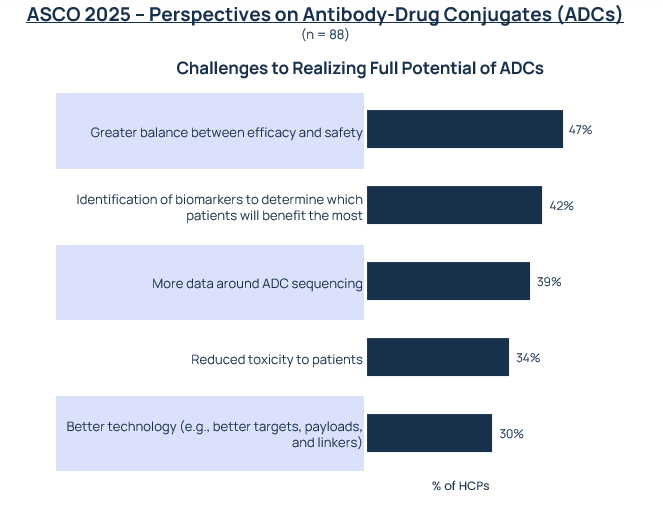The American Society of Clinical Oncology's 2025 Annual Meeting defied industry expectations, delivering meaningful clinical advances that have the potential to change oncology practice. Despite some industry analysts describing #ASCO25 as lacking in blockbuster readouts, ZoomRx’s panel of practicing oncologists expressed enthusiasm about the clinical data presented and optimism about the impact of conference on the future of cancer treatments.
The ZoomRx 7th Annual ASCO survey was conducted between June 5th and June 12th with N=88 practicing oncologists, who attended the ASCO25 Conference in-person.
The 2025 ASCO Annual meeting generated remarkable positive sentiment among practicing oncologists. An overwhelming 85% of attendees reported that the conference exceeded their expectations—a substantial improvement from 68% in the previous year. Also, over two-thirds of oncologists characterized the presented research at ASCO25 as representing major progress or breakthrough advances, surpassing historical benchmarks of 57-59% in previous years.

The oncologists’ positive sentiments of ASCO25 were driven by the conference generally addressing oncologists’ top interests and clinical priorities; providing coverage of developments in “tried and true” and emergent MOAs including ADCs, Immunotherapies and immuno-bispecific antibodies and the delivery of several practice-changing trials.
Based on the attendees’ responses, the conference projected a tone of resolve to maintain the pace of scientific progress, even though the concerns about the cuts to NIH and Cancer Institute funding were raised during the opening session as well as throughout the conference.
KEY THEMES AND PRIORITIES
In a true reflection of our times, AI applications in scientific discoveries and delivery of care captured many oncologists’ attention as a dominant theme at ASCO25. The potential of AI was featured in the Presidential address and opening session, and it’s not surprising that it captured attendees’ attention. However, it was the clinical focus on progress in tumor monitoring and timing and sequencing of therapies to optimize patient survival and quality of life that dominated the conference according to ZoomRx panelists.
Circulating tumor DNA (ctDNA) monitoring stood out as a major clinical theme, reflecting Oncology's movement toward more precise treatment monitoring and disease management.


The conference also showcased significant momentum toward incorporating immunotherapies in earlier treatment stages, especially into neoadjuvant settings - potentially expanding addressable patient populations and leading to more curative patient outcomes. Optimal treatment sequencing in advanced settings focused on maximizing overall survival (across lines of therapy) and ensuring lasting quality of life for patients.
These key themes were generally aligned with what oncologists responding to the ZoomRx’s Annual ASCO Survey also see as their top priorities for their practices.
I. ESTABLISHED AND EMERGENT TREATMENT CLASSES:
ADCs continue to be seen as impactful to clinical practice both short-term and long-term, with immunotherapy bispecific antibodies seen as an emergent class with the potential to transform oncology, especially in the long term.
ADCs and bi-specific antibodies, especially those targeting PD-L1+VEGF, captured oncologists’ attention as most promising in changing oncology practices in the immediate future (12 months). In the longer term, oncologists saw the promise of T-cell engagers.
While oncologists expressed strong optimism about ADCs’ future to become “a cornerstone class of targeted therapy over the next several years”, nearly half (47%) of oncologists also recognized need to achieve greater balance between efficacy and safety, with better identification of patients who are most likely to benefit from these potent treatments.


II. PRACTICE-CHANGING SESSIONS:
Over a dozen presentations were hailed as being potentially practice-changing by the ASCO25 conference presenters and discussants. However, only a few of these passed the oncologists’ high bar for becoming their new standard of care (SOC) and several were seen as expanding therapeutic options but falling short of the new SOC bar.
Using the list of sessions mentioned below we asked oncologists who attended the relevant sessions to rate them on their potential to become the new SOC versus adding to their armamentarium of available treatments.
While short of full consensus, over 50% of oncologists who attended the relevant sessions agreed that BREAKWATER, ATOMIC, and MATTERHORN would become the new SOC in their respective indications or settings once approved. These clinical trials were seen as providing exceptionally strong clinical evidence that resonated consistently across both academic and community physicians, with very few outstanding questions raised by attendees.

A plurality of oncologists (33%-44%) also thought that several other treatments had the potential to become their new SOC (if approved): NeoADAURA, ASCENT04/KEYNOTE-D19, INOVO120, DeLLphi-304, C-POST Cemi, IMforte, NIVOPOSTOP, and DESTINY BREAST-09.
However, there was less consensus around these emerging indications, with many oncologists viewing them as meaningful additional options rather than fully endorsing them as the new standard of care. Key concerns centered on the lack of clear evidence on optimal sequencing and the trade-offs between survival benefit and quality of life. Perspectives also diverged by setting—community oncologists were more open to adoption based on the presented evidence, compared to academic oncologists who remained cautious, awaiting more definitive data. Oncologists said that additional discussions through advisory boards, peer forums, or summary emails highlighting key trial insights could help build confidence and clarify where these treatments best fit in the evolving landscape.
Conclusions
ASCO25 reinforced hope for the future of cancer care, spotlighting how AI and other technological advances can accelerate the application of best practices and innovation in oncology practices across all settings and geography. Progress across both established and emerging therapies—like ADCs, bispecific antibodies, and other novel targeted treatments—offers new promise for difficult-to-treat categories and indications. As oncologists return to their practices, they bring with them expanded options for their patients and renewed support for continued investment in scientific and pharmaceutical research.
Get in touch with us


